|
XII -
Immortality - The Grand Illusion
Once upon a time the whole of Mankind lived in Paradise - satiated
from eating the Fruit of Knowledge, but forbidden from reaching for
the fruit of the Tree of Life.
Then God, mistrusting his own
creation, said to unnamed colleagues: The Adam, having eaten of the
Tree of Knowing,
"has become as one of us; what if he put forth his
hand and took also of the Tree of Life, and ate, and lived forever?"
And to prevent that, God expelled Adam and Eve from the Garden of
Eden.
Man has searched for that God-withheld immortality ever since. But
throughout the millennia, it has gone unnoticed that while in
respect to the Tree of Knowing Yahweh Elohim stated that having
eaten of it "The Adam has become as one of us" - no such "as one of
us" is asserted in respect to "living forever" from the fruit of the
Tree of Life.
Was it because "Immortality," dangled before Mankind as a
distinctive attribute of the gods, was no more than a Grand
Illusion?
If ever did someone try to find out, it was Gilgamesh, King of Uruk,
son of Ninsun and Lugalbanda.
As enchanting and revealing the tales of Enmerkar and Lugalbanda
are, without doubt the post-Diluvial Lugal and demigod of whom we
have the longest and most detailed records is Gilgamesh, who reigned
in Uruk from circa 2750 to circa 2600 B.C.
The long Epic of
Gilgamesh relates his search for immortality - because "two-thirds
of him is god, one-third of him is human," and he believed that
therefore he should not "peer over the wall" as a mortal.
The genealogical lineage that made him more than a demigod, more
than a fifty-fifty god, was impressive. His father, Lugalbanda, both
king and high priest in Uruk, was a son of Inanna and was endowed
with the "divine" determinative. His mother, Nin.sun (= ‘Lady Who
Irrigates’) was a daughter of the great deities Ninurta and his
spouse Ba’u, which explains why Gilgamesh was described as being of
the "essence of Ninurta" (Enlil’s foremost son).
Bau herself was of
no mean lineage: She was the youngest daughter of Anu.
That was not the whole pedigree of Gilgamesh. He was born in the
presence and under the aegis of the god Utu (twin brother of Inanna
and a grandson of Enlil) - an aspect that leads scholars to call Utu/Shamash
the ‘godfather’ of Gilgamesh. And he was also "looked upon with
favor" on the Enki’ite side, for his full theophoric name,
Gish.bil.ga.mesh, linked him to dGibil, a son of Enki and the god of
metal foundries.
According to a Hittite version of the Epic of Gilgamesh, he was
"lofty, endowed with a super-human size" - attributes undoubtedly
inherited not from the father (‘King Shorty’) but from the mother’s
side, for the mother of Ninsun, the goddess Bau, was true to her
nickname Gula - plain and simple, ‘The Big One’.
Bestowed with talents and prowess by several gods, tall, muscular,
and shapely (Fig. 87), Gilgamesh was likened to a wild bull; bold
and untamed in spirit, he constantly challenged the city’s youths to
wrestling matches (which he always won).
"Unbridled in arrogance,"
he "left not a maiden alone."
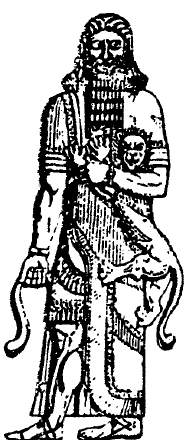
Figure 87
Finally the city’s elders appealed to
the gods to stop Gilgamesh when he started to demand ‘first rights’
with brides on their wedding night.
Responding, the gods fashioned in the steppe a wild man as a double
of Gilgamesh - "Like Gilgamesh in build, though shorter in stature."
Called Enki.du (= ‘By Enki created’), his task was to shadow
Gilgamesh and force him to change his ways.
Discovering that they
have on their hands an uncouth Primitive who knows not cooked food
and befriends animals, the city’s elders put him up outside of town
with a harlot, to learn "the ways of Man."
She also cleaned and
clothed him, and made his hair in curls; when he finally entered
town, he was a Gilgamesh duplicate!
Challenged to a wrestling match by an incredulous Gilgamesh, Enkidu
wrestled him down and instilled humility in him; and the two became
inseparable comrades.
Deprived of his haughtiness and losing his prowess, Gilgamesh began
to ponder matters of aging, of life and death.
"In my city man dies,
oppressed is my heart; man perishes, heavy is my heart," Gilgamesh
told his ‘godfather’ Utu; "Will I also peer over the wall, will I be
fated thus?" he asked.
The response he got from his mentor was not
encouraging:
Why, Gilgamesh, do you rove about?
The Life that you seek, you shall not find!
When the gods created Mankind,
Death for Mankind they allotted;
Enduring Life they retained in their own keeping.
Live and enjoy life day by day, Utu/Shamash advised Gilgamesh; but a
series of dreams and omens, including a crashed celestial object,
convinced Gilgamesh that he could avoid a mortal’s end were he to
join the gods in their heavenly abode.
Enkidu, he learnt, knew the
way to the "Landing Place of the Anunnaki" in the Cedar Forest - a
great platform with a launch tower, all built of colossal stone
blocks, that served as the Earth-terminal for the Igigi and their
shuttlecraft (see Fig. 60).
It was a place from which he could be
taken aloft by the Igigi; and Gilgamesh asked his mother for her
advice and help.
Told that "only the gods can scale heaven, only the
gods live forever under the sun," and warned by Enkidu of the
monster Huwawa who guards the place, Gilgamesh answered with words
that resonate to this day:
As for Mankind,
numbered are their days;
Whatever they achieve,
is but the wind ...
Let me go there before you,
Let your mouth call out,
"Advance! Fear not!"
And should I fall,
I shall have made me a name:
"Gilgamesh," they will say,
"against fierce Huwawa has fallen."
Realizing that Gilgamesh would not be deterred, Ninsun, his mother,
appealed to Utu/Shamash to grant Gilgamesh extra protection.
"Wise
and ..versed in all knowledge," Ninsun was also practical.
Taking Enkidu aside, she made him swear that he would bodily protect
Gilgamesh.
To assure his fidelity, she offered him a reward beyond
anyone’s dreams: A young goddess as wife. (The partly damaged lines,
at the end of Tablet IV of the Epic, suggest that Ninsun had
discussed with Aya, spouse of Utu/ Shamash, which one of their
daughters the bride should be.)
Then Utu/Shamash himself gave Gilgamesh and Enkidu divine sandals
that enabled them to reach the Cedar Mountain in a fraction of time,
and off were the comrades on their Cedar Forest adventure.
Though no map has been found alongside the ancient text, there is no
uncertainty regarding the comrades’ destination: In the all of the
Near East - in the whole of Asia - there is only one Cedar Forest:
In the mountains of what is now Lebanon; and it was there that the
gods’ "Landing Place" was located.
Reaching the mountain range, the comrades were awed by the sight of
the majestic cedar trees and stopped for the night at the foot of
the forest.
But during the night Gilgamesh was awakened from his
sleep by the shaking of the ground; he managed to glimpse a "sky
chamber" lifting off.
"The vision that Gilgamesh saw was wholly
awesome":
The heavens shrieked, the earth boomed;
Though daylight was dawning, darkness came.
Lightning flashed, a flame shot up.
The clouds swelled, it rained death!
Then the glow vanished; the fire went out;
And all that had fallen was turned to ashes.
The sight and sounds of a rocketship launched was truly awesome; but
as far as Gilgamesh was concerned, the night’s events confirmed that
they had reached the ‘Landing Place’ of the gods.
(A Phoenician coin
from a much later time still depicted the site with a rocket poised
on its platform, Fig. 88.)
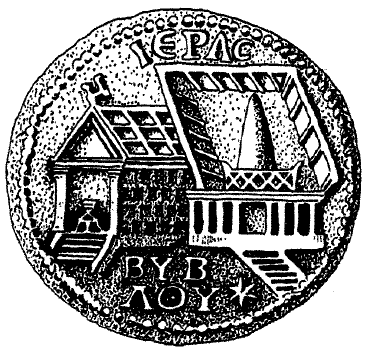
Figure 88
At daybreak the comrades began to seek
the entrance, careful to avoid "weapon-trees that kill."
Enkidu
found the
gate; but when he tried to open it, he was thrown back by an unseen
force. For twelve days he lay paralyzed.
When he was able to move and speak again, he pleaded with Gilgamesh
to give up the attempt to open the gate. But Gilgamesh had good
news: While Enkidu was immobilized, he (Gilgamesh) had found a
tunnel; it might lead them directly to the command center of the
Anunnaki! He persuaded Enkidu that the tunnel was the best way in.
The entrance to the tunnel was blocked by overgrown trees and
bushes, soil and rocks.
As the comrades began to clear it all,
"Huwawa
heard the noise and became angry."
The guardian of the place, Huwawa
was as monstrous as Enkidu had described him:
"Mighty, his teeth as the teeth of a
dragon, his face the face of a lion, his coming like the onrushing of floodwaters." Most fearsome was his "radiant
beam": Emanating from his forehead, "it devoured trees and bushes;
none could escape its killing force... As a terror to mortals has Enlil appointed him."
With no way to escape, the comrades suddenly heard Utu/Shamash speak
to them.
Do not run to escape, he told them; instead, let Huwawa
come near you, then throw dust in his face! Doing as advised, the
comrades managed to immobilize Huwawa. Enkidu struck him, and the
monster fell to the ground.
Enkidu then "the monster put to death."
With "the way to the secret abode of the Anunnaki opened up," the
comrades took time to relax and savor their victory. They stopped to
rest by a stream; and Gilgamesh took off his clothes to bathe and
refresh himself. Unbeknown to them, the goddess Inanna had been
watching it all from her skychamber.
Attracted by the king’s
outstanding physique, the ever-young Inanna made her desire clear as
she addressed him:
Come, Gilgamesh,
be thou my lover!
Grant me the fruit of thy love,
You be my man,
I shall be your woman!
Promising him a golden chariot, a magnificent palace, lordship over
other kings and princes - Inanna was sure that she enticed
Gilgamesh; but answering her, he pointed out that he had nothing to
offer her, a goddess, in return; and as to the ‘love’ she promised -
how long did her former lovers last?
Listing five of them, Gilgamesh
described how Inanna "as a shoe which pinches the foot of its owner"
cast them off, one after the other, uncaring once their vigor ran
out.
The rebuff enraged Inanna.
Complaining to Anu,
"Gilgamesh has
insulted me!" she said, and asked him to let loose against Gilgamesh Gud.anna - the ‘Bull of Anu’ or the ‘Bull of Heaven’ - who roamed in
the Cedar Mountain.
And though warned by Anu that the beast’s
release will bring about seven years of famine, Inanna insisted that
Anu let it loose.
Forgetting the tunnel and the Landing Place, Gilgamesh and Enkidu
ran for their lives.
The magical sandals that Utu gave them enabled them "a distance of
one month and fifteen days in three days to traverse." Gilgamesh
rushed into the city to mobilize its fighters; Enkidu faced off the
monster outside Uruk’s walls.
Each snort of the Bull of Heaven
created a pit into which a hundred fighters fell. But as the Bull of
Heaven turned around, Enkidu struck it from behind, and killed it.
Speechless at first, "Inanna to Anu raised a cry," demanding that
the slayers of Huwawa and the Bull of Heaven be put on trial.
An
ancient artist depicted on a cylinder seal (Fig. 89) a gloating Enkidu with the
slain Bull of Heaven, and Inanna addressing Gilgamesh under the sign
of the Winged Disc.
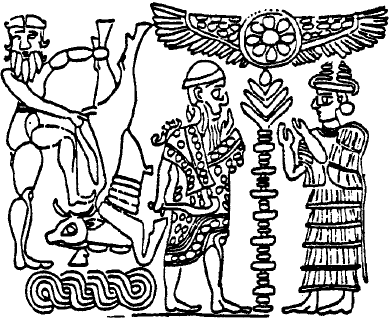
Figure 89
Deliberating, the gods’ views differed. Having slain both Huwawa and
the Bull of Heaven, let Enkidu and Gilgamesh both die, Anu said.
Gilgamesh did no slaying, let only Enkidu die, Enlil said. The
comrades were attacked by the monsters, so no one should die, Utu
said. In the end, Gilgamesh was spared; Enkidu to toil in the Land
of Mines was sentenced.
* * *
Still seething from the failed attempt at the Cedar Forest,
Gilgamesh did not give up his quest to join the gods in their
Celestial Abode.
Apart from the Landing Place in the north there was
the Spaceport, "where the gods ascend and descend." Focal point of
new landing and takeoff facilities built by the Anunnaki to replace
the earlier ones destroyed by the Deluge, the Spaceport was located
in the sacred Fourth Region of Tilmun (= ‘Place/Land of the
Missiles’) in the Sinai peninsula.
The grand pattern incorporated
the pre-Diluvial landing platform in the Lebanon mountains (A’ on
map, Fig. 90), required the building of the two great pyramids as
guidance beacons in Egypt (‘B’ on map, Fig. 90), and established a
new Mission Control Center (‘C’ on map, Fig. 90) at the place we
call Jerusalem.
Tilmun was a zone forbidden to mortals; but Gilgamesh - "two- thirds
of him divine" - figured he might be exempt from the prohibition;'
after all, it was there that Utnapishtim/Ziusudra, he of Deluge
fame, was taken to live! And so was a plan conceived by Gilgamesh
for the second attempt to find Immortality.
Loathe to see Enkidu
gone, Gilgamesh had an idea:
The Land of Mines was on the sailing
way to Tilmun; let the gods allow him to go there by ship - and he
will drop off Enkidu on the way.
Once more Ninsun had to make
appeals; once again, Utu gave grudging help.
And so it was that the comrades were still alive and together as
their ship was passing through the narrow strait leading out of the
Persian Gulf (as it is now called). At the narrows, on the shore,
they noticed a watchtower.
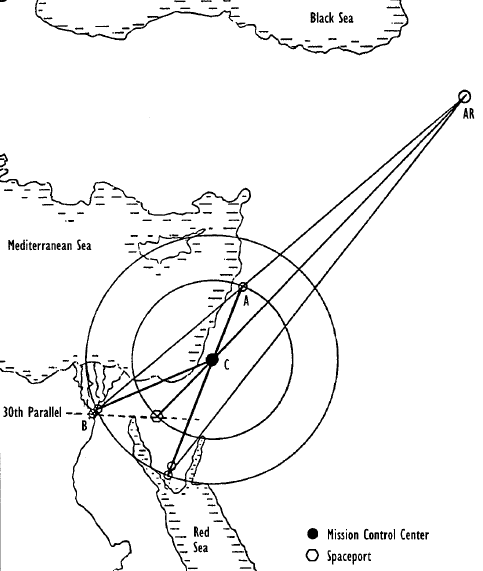
Figure 90
A watchman, armed with a beam like Huwawa’s,
questioned them.
Ill at ease,
"Let us turn back!" Enkidu said. "On
we go!" Gilgamesh said.
A sudden wind, as though driven by the
watchman’s beam, tore the ship’s sail and overturned the boat.
In
the still darkness of the depths, Gilgamesh saw Enkidu’s floating
body and dragged it ashore, hoping for a miracle. He sat by his
comrade and mourned him day and night, until a worm came out of
Enkidu’s nostrils.
Alone, lost, and despondent, Gilgamesh at first roamed the
wilderness aimlessly;
"When I die, shall I not as Enkidu be?" he
wondered.
Then his self-confidence returned, and "to Utnapishtim,
son of Ubar- Tutu, he took the road."
Guided by the Sun - he kept
going west. At night he prayed to Nannar/Sin, the Moon god, for
guidance. One night he reaching a mountain pass; it was the habitat
of desert lions, and Gilgamesh wrestled two of them down with his
bare hands. He ate their flesh as raw meat, with their skins he
clothed himself.
It was an omen that he will overcome all obstacles, Gilgamesh
believed; it was also an episode of the epic that artists throughout
the ancient world, the Americas included, liked to illustrate as
they told the tale (Fig. 91).
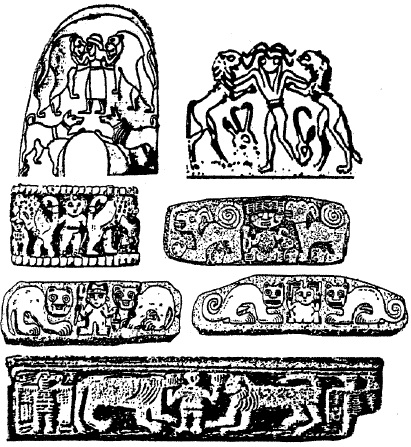
Figure 91
* * *
Crossing that mountain range, Gilgamesh could see in the distance
below a shimmering body of water. In the adjoining plain he could
see a city "closed up about" - surrounded by a wall. It was a city
"whose temple to Nannar/Sin was dedicated" - the city known from the
Bible as Yeriho (= ‘Moon city’), Jericho in English.
He had reached,
the text explains later, the Salt Sea (the ‘Dead Sea’ in current
English, Yam Hamelakb ‘The Sea of Salt’, in the Bible).
Outside the city, "close by the low-lying sea," there was an inn,
and Gilgamesh set his steps toward it.
The Ale-Woman, Siduri, saw
him coming and prepared a bowl of porridge; but as he came closer
she was frightened, for he wore skins and his belly was shrunk.
It
took some time for her to believe his story that he was a famed
king, looking for his long-living ancestor.
"Now, ale-woman,"
Gilgamesh said, "which is the way to Utnapishtim?"
It is a place
beyond the Salt Sea, Siduri said, adding that,
Never, O Gilgamesh, has there been a crossing!
From the Beginning of Days
none who came could cross the sea -
Only valiant Shamash crosses the sea!
Toilsome is the crossing,
desolate is the way thereto,
Barren are the Waters of Death
which it encloses.
How then, Gilgamesh, will you cross the sea?
With no answer, Gilgamesh remained silent.
Then Siduri spoke up
again. There is, after all, a way to cross the Sea of the Waters of
Death: Utnapishtim has a boatman who comes across from time to time
for supplies; Urshanabi is his name; go, let him see your face - he
might take you across on a raft made of logs.
When the boatman, Urshanabi, arrived, he too (like the ale-woman
earlier) found it difficult to believe Gilgamesh that he was once
king of Uruk, and Gilgamesh had to tell him the whole tale of his
search for
immortality, the adventures at the Landing Place, the death of
Enkidu, and his wanderings in the wilderness, ending with his
encounter with the ale-woman, omitting nothing.
"I ranged and
wandered over all the lands, I traversed difficult mountains, I
crossed all the seas," he said, so that "now I might come and behold Utnapishtim, whom they call The Faraway."
Finally persuaded, the boatman took him across and advised him to
proceed in the direction of,
"the Great Sea, which is in the
Faraway."
But he had to make a turn when he reached two stone
markers, go to a town (called Ulluyah in a Hittite rendering), and
obtain there permission to continue to Mount Mashu.
Following the directions, but cutting short a stay in Ulluyah,
Gilgamesh proceeded to Mount Mashu, only to discover that it was
more than a mere mountain:
Rocket-men guard its gateway;
their terror is awesome, their glance is death.
Their glaring beam sweeps the mountains;
They watch over Shamash as he ascends and descends.
"When Gilgamesh beheld them, with fear and terror was darkened his
face" - and no wonder, judging by the way ancient illustrators
depicted them (Fig. 92). The guards were just as surprised; as a
Rocket- man-’s beam swept its glare over Gilgamesh, with no apparent
effect, he called to his fellow guard: ‘He who approaches us, his
body is the flesh of the gods! Two-thirds of him is god, one-third
is human!’
"Why have you come here?" they challenged Gilgamesh, "the purpose of
thy coming we need to learn." Regaining his composure, he approached
them. "On account of Utnapishtim, my forefather, who joined the
Assembly of the gods have I come, about Death and Life I wish to ask
him," Gilgamesh answered.
"Never was there a mortal who could achieve that!" the Rocket-man
said, telling him of Mount Mashu and the underground passageway to
it. "The mountain’s trail no one has traveled; for twelve leagues
extends
its interior; dense is the darkness, light there is none!" But
Gilgamesh was not dissuaded, and the Rocket-man "the gate of the
mountain opened for him."
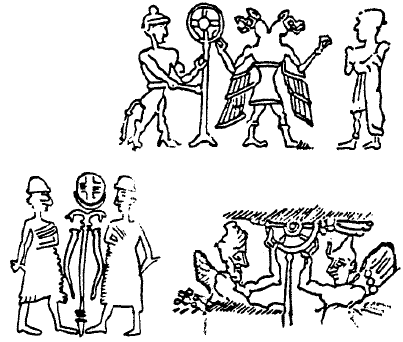
Figure 92
For twelve double-hours Gilgamesh advanced in the tunnel in
darkness, feeling a fresh air breeze only at the ninth hour; a faint
light appeared in the eleventh double-hour.
Then he walked out into
brightness and an incredible sight: an "enclosure of the gods" in
which there grew a ‘garden’ made entirely of precious stones -
As its fruit it carries carnelians,
its vines too beautiful to
behold.
The foliage is of lapis lazuli;
the grapes, too luscious to look at,
of [... ] stones are made.
Its [... ] of white stones [... ],
In its waters, pure reeds [... ]
of Sasu-stones Like a Tree of
Life and a Tree of [ . .. ]
that of An.gug stones are made.
As the description goes on, it becomes clear that Gilgamesh found
himself in an artificial Garden of Eden, made entirely of precious
stones. Gilgamesh was marveling at the sight when he suddenly saw
the man he went searching for, the "One of the Faraway."
Coming face
to face with an ancestor from millennia past, this is what Gilgamesh
had to say:
As I look upon thee, Utnapishtim,
Thou art not different at all,
even as (though) I am thou...
Then, telling Utnapishtim of his search for Life and the death of
Enkidu, he said to him, to Utnapishtim:
Tell me,
How did you join the congregation of the gods in thy quest for Life?
Well, Utnapishtim said, it was not that simple.
A secret of the gods
let me tell you, he said:
Once, the Anunnaki, the great gods, convened;
Mammetum, maker of Fate, with them the fates determined...
Shuruppak, a city which thou knowest,
a city which on the Euphrates
is situated,
that city was ancient, as were the gods within it.
When their heart led the great gods to the Deluge,
the Lord of Pure
Foresight, Ea, was with them.
Their words he repeated (to me) through the reed wall:
"Man of Shuruppak, son of Ubar-Tutu,
Tear down house, build a ship!
Give up possessions, seek thou Life!
Aboard the ship take the seed of all that lives."
Describing the ship and its measurements, Utnapishtim went on to
tell Gilgamesh that the townspeople of Shuruppak helped build the
ship for they were told that they would thereby get rid of
Utnapishtim, whose god was quarreling with Enlil.
Telling the whole
story of the
Deluge, Utnapishtim related how Enlil discovered Ea/Enki’s
duplicity, and how Enlil, changing his mind, blessed Utnapishtim and
his wife to live henceforth "the life of the gods":
Standing between us,
he touched our foreheads to bless us:
"Hitherto, Utnapishtim has been human;
henceforth, Utnapishtim and
his wife
like gods shall be unto us.
Faraway shall the man Utnapishtim reside,
at the mouth of the
water-streams."
"But now," Utnapishtim went on to say to Gilgamesh, "who will for
thy sake call the gods to Assembly, that the Life that thou seekest
thou mayest find?"
Hearing that, and realizing that his search has been in vain, for
only the gods, in assembly, can grant Eternal Life - Gilgamesh
fainted, lost consciousness, and collapsed.
* * *
For six days and seven nights Utnapishtim and his wife kept vigil as
Gilgamesh slept uninterrupted. When he finally awoke, with the help
of Urshanabi they bathed Gilgamesh and dressed him with clean
garments as befits a king returning to his city.
It was at the very
last moment that Utnapishtim, pitying Gilgamesh as he was leaving
empty handed, suddenly said to him:
"What shall I give thee, as you
return to thy land?"
He had a going-away gift for him, a "secret of
the gods":
To you, O Gilgamesh, a hidden thing I will disclose -
A secret of the gods I will tell thee:
A plant there is, like the buckthorn’s is its root.
Its thorns are like a brier-vine’s, thy hands they will prick.
(But) if thy hands obtain the plant,
New Life thou shall find!
The rejuvenating plant, Utnapishtim said, grows at the bottom of a
water hole (or well) - and showed Gilgamesh where.
"No sooner did
Gilgamesh hear this, than he opened the water pipe. He tied heavy
stones to his feet; they pulled him down into the deep, and he saw
the plant. He grabbed the plant, though it pricked his hands. He cut
the heavy stones from his feet; the well cast him up by its shore."
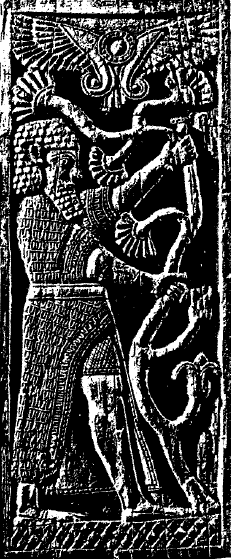
Figure 93
Holding on to the rejuvenating plant - a scene possibly depicted on
an Assyrian monument, Fig. 93 - the overjoyed Gilgamesh spilled out
to Urshanabi, the boatman, his future plans:
Urshanabi, this plant is a plant unlike any,
Whereby a man may regain his life’s breath!
I will take it to ramparted Uruk,
I will cause [... ] to eat the plant [... ],
‘Man Becomes Young In Old Age’ its name shall be.
I myself shall eat (of it),
and to my youthful state I shall return!
Certain that he had finally attained his life’s dream, Gilgamesh
started on the way back to Uruk, accompanied by Urshanabi.
After
twenty leagues Gilgamesh and Urshanabi "stopped for a morsel."
After
another thirty leagues,
"they saw a well and stopped for the night."
Filled with visions of rejuvenation, Gilgamesh put down the bag with
the unique plant to take a refreshing swim; and while he was not
watching,
A serpent sniffed the fragrance of the plant;
It came up from the water and carried off the plant.
And Gilgamesh sat down, and wept,
His tears running down his face.
Gilgamesh the demigod cried, for once
again Fate had snatched for him defeat out of success.
Mankind, one believes, has cried ever
since - for this was the greatest irony of all: It was the
Serpent who encouraged Mankind to eat of the Forbidden Fruit without
fear of dying - and it was the Serpent who robbed Man of the Fruit
of Not Dying...
Was it again a metaphor for Enki?
* * *
Gilgamesh, the
Sumerian King List says, reigned for 126 years and
was followed on the throne by his son Ur.lugal.
His death, as his
whole tragic tale, leaves unanswered the question that is its
central theme: Can Man - even if he be partly god - avoid mortality?
And if his life was an unanswered puzzle, his death was even more so
when it comes to his burial.
From Gilgamesh in the 3rd millennium B.C. to Alexander in the 4th
century B.C. to Ponce de Leon (searching for the Fountain of
Youth) in the 16th century A.D., Man has searched for a way to
avoid, or at least postpone, dying.
But is that universal and
ongoing search the opposite of what Man’s creators had planned? Do
the cuneiform texts and the Bible imply that the gods deliberately
held back immortality from Man?
In the Epic of Gilgamesh the answer is a statement that is given as
fact, amounting to a Yes:
When the gods created Mankind,
Death for Man they allotted -
‘Everlasting life’
they retained in their own keeping.
Gilgamesh heard it from his godfather Utu/Shamash, when his interest
in Life and Death matters began, and once more from Utnapishtim
(after Gilgamesh told him his journeys’ purpose).
The answer is:
It’s a useless effort - Man cannot escape his mortality, and the
whole long tale of Gilgamesh seems to confirm that.
But let us re-read the tale, and the irony in that apparent answer
emerges:
The way to attain the longevity of the gods, his mother
told Gilgamesh, was to join them on their planet.
That explains why
the same Utu/Shamash who at first said ‘Forget it’, then provided
help to Gilgamesh on his two attempts to go where the rocketships
ascend and descend.
Failing that, a "secret of the gods" was
revealed to Gilgamesh: The existence of a rejuvenating Plant of Life
right here on Earth. And that raises the question about the gods
themselves:
Did their "everlasting life" also depend on such a
nutrient - were they not the wonted ‘Immortals’?
Interesting light is cast on the subject from ancient Egypt, where
the Pharaohs held the belief that everlasting life awaits them in an
Afterlife if they could join the gods on the "Planet of Millions of
Years."
To achieve that, elaborate preparations were made ahead of
time to facilitate the Pharaoh’s journey after his death. Starting
with the exiting by the Pharaoh’s Ka (a kind of an Afterlife Alter
Ego) from his tomb via a simulated door, the king journeyed to the Duat in the Sinai peninsula,
there to be taken aloft for a space trip. (The existence of such a
facility in the Sinai was attested by a tomb depiction showing a
multistage rocketship [akin to the Sumerian Din.gir symbol!] in an
underground silo, Fig. 94.)
Detailed text and drawings in the Book
of the Dead then described the subterranean facilities, the rocketships’ pilots, and the breath-taking liftoff.
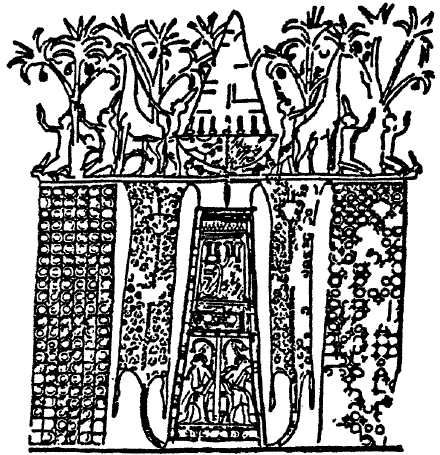
Figure 94
But the purpose of the space journey was not to merely reside on the
gods’ planet.
"Take ye this king with you, that he may eat of that
which you eat, that he may drink of that which ye drink, that he may
live on that whereupon you live," an ancient Egyptian incantation
appealed to the gods.
In the pyramid of King Pepi, an appeal was
made to the gods whose abode was on the,
"Planet of millions of
years" to "Give unto Pepi the Plant of Life on which they themselves
are sustained."
A colorful drawing on Pyramid walls showed the king
(here accompanied by his wife) arriving in the Afterlife at the
Celestial
Paradise, sipping the Water of Life out of which there grows the
Tree of the Fruit of Life (Fig. 95).
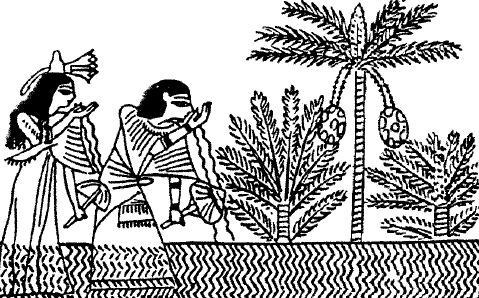
Figure 95
The renderings from the Egyptian side regarding the gods’ Water of
Life and Food/Fruit of Life match the Mesopotamian depictions of
Winged Gods ("Eaglemen"), flanking the Tree of Life as they hold in
one hand the Fruit of Life and in the other a pail of the Water of
Life (see
Fig. 72).
The notions underlying these depictions are no
different from the Hindu tales of the Soma - a plant that the gods
had brought to Earth from the heavens - whose leaves’ juice
conferred inspiration, vitality, and immortality.
While all that appears to be in accord with the biblical take on the
subject, which is best known from the tale of the two special trees
in the Garden of Eden - the Tree of Knowing and the Tree of Life,
whose fruit could make Adam "live for ever" - the biblical tale also
relates a divine effort to prevent Man from partaking in that fruit.
Man was expelled from Eden "lest he try," and God was so determined
to prevent the Earthlings from regaining access to the Tree of Life,
that He,
"placed at the east of the Garden of Eden the Cherubim and
the flaming sword which revolveth, to guard the way to the Tree of
Life."
The tale’s essential element - of Man’s creator trying to prevent
him from having divine nourishments - is found in the Sumerian tale
of Adapa.
There we find the Creator of Man himself, Enki, treating
the "perfect model of Man," his own Earthling son Adapa, thus:
Wide understanding he perfected for him;
Wisdom he had given him;
To him he had given Knowledge -
Lasting life he had not given him.
Then Enki’s own handiwork is put to the test: Adapa, his son by an
Earthling woman - a marvel invited by Anu to Nibiru - is offered
there the "Food of Life" and the "Water of Life," but is told by
Enki to avoid both, for they will cause Adapa’s death.
That, it
turns out, is not true - just as God’s warning to Adam and Eve that
eating the fruit of the Tree of Knowing would cause death was not
true. What worries God (in the Garden of Eden tale) is not the
couple’s risk of death but the opposite:
"What if the Adam put
forth his hand and took also of the Tree of Life, and ate of it, and
lived forever?"
(The Hebrew words in the Bible are Ve’akhal ve Chai Le’Olam -
"and he ate and lived to OLAM." The term Olam, usually translated
"forever, everlasting," etc., can also refer to a physical place, in
which case Olam is translated ‘World’. It can also stem, I have
suggested, from the verb that means ‘to vanish, to be unseen’, so
that Olam could be the Hebrew name for Nibiru, and in this context,
the longevity place. See "Words and Their Meaning".)
God, thus, was worried that were The Adam to eat of the Tree of
Life, he would gain the life span "of Olam’, the life cycle of Nibiru.
In the Sumerian text Enki tricks Adapa not to have the divine
nourishments simply because when Man was created, Everlasting Life
was deliberately held back from him.
While the existence of a Food
of Life is affirmed, it is not Immortality - it is "Lasting Life,"
Longevity - that has been deliberately held back from Man. The two
may have the same short term result, but they are not the same
thing.
Now, what was that "Life of Olam," life on Nibiru - an endless
immortality or simply a great longevity that on Nibiru is counted in
Shar units - 3,600 times longer than Earth’s life cycles?
The notion
of gods (or even demigods) as Immortals has come to us from Greece;
the discovery in late 1920s of Canaanite ‘myths’ at their capital
Ugarit (on Syria’s Mediterranean coast) showed how the Greeks got
the idea: From the Canaanites, via the island of Crete.
But in Mesopotamia, the Anunnaki gods never claimed absolute Not
Dying - Immortality - for themselves.
The very listing of earlier
generations on Nibiru amounts to saying: Those were the forebears
who have died. The tale of Dumuzi was a public telling of his death,
a death recorded and mourned (even in Jerusalem at the time of the
Prophet Ezekiel) on the anniversary month of Tammuz.
Alalu was
sentenced to die in exile; An.Zu was executed for his crime; Osiris
was killed and dismembered by Seth; the god Horus died from a
scorpion’s sting (but was revived by Thoth).
Inanna herself was
seized and put to death when she entered the Lower World without
permission (but was revived through Enki’s efforts).
There was no immortality, nor even a claim of immortality by the
Anunnaki.
There was an illusion of immortality, caused by extreme
Longevity.
That longevity was apparently associated with living on Nibiru and
not just being sustained by some of Nibiru’s unique nourishments,
for otherwise what purpose was there for Ninsun to encourage
Gilgamesh to go there, to attain the "Life of a god."
An interesting question for modern science to ponder is this: Was
the life cycle longevity (on Nibiru, or anywhere else in the
universe) an aqcuired trait, or an evolutionary genetic adjustment?
The statement associated with Adapa suggests a genetic decision by
Enki - that a ‘Longevity Gene (or genes), known to Enki, was
deliberately excluded from the human genome when the ‘mixing’ of
genes took place.
Could we ever find it?
That a key with which those genetic secrets could be unlocked might
be available, is where our trail of gods and demigods is leading.
SPELLING OUT
'LIFE'
The King James translators of the Hebrew Bible, and virtually all
who followed them, have done their best to instill a sense of Divine
Spirit, a majestic awe of a Creator of All, in the creation stages
described in Genesis.
The "winds" - satellites - of Nibiru/Marduk,
Ru’ah in Hebrew, become the Spirit (of God) hovering over dark
chaos; the Elohim, fashioning The Adam "in our image and after our
likeness," breathe the "breath of life" (Neshamah) into his nostrils
and give him a "soul."
On our way we have stopped here and there in this book to (a) point
out misconceptions stemming from mistranslations, and (b) to
highlight instances where the Hebrew is a literal rendering of a
Sumerian term, identifying source word by word and making
understanding the verse clearer.
It was the noted Sumerologist Samuel Noah Kramer who had pointed out
that in the tale of fashioning Eve out of Adam’s rib - Tsela in
Hebrew - the Hebrew redactor must have taken the Sumerian word Ti to
mean "rib" - correctly, except that a similarly pronounced word Ti
in Sumerian meant "Life," as in Nin.ti (= ‘Lady Life’): What was
done was to take that which is "Life" - DNA - from the Adam and
manipulate it to obtain a female genetic chromosome.
These instances come to mind as one reads the actual Sumerian
wording used by Ziusudra to tell Gilgamesh how Enlil granted him the
"Life of a god":
Ti Dingir.dim Mu.un.na Ab.e.de
Zi Da.ri Dingir.dim Mu.un.na Ab.e.de
Two Sumerian terms, Ti and Zi, both usually translated ‘Life’, were
used here; so what was the difference? As best as one can determine,
Ti was used to indicated the physical godlike aspects; Zi expressed
Life’s functioning, how the living is carried out.
To make his
meaning extra clear, the Sumerian author added the term Da.ri (=
‘Duration’)
to Zi; what Ziusudra was granted was both the physical aspects of
godly life, as well as the durability aspects of it.
The two lines are usually translated "Life like that of a god he
gives to him, an eternal soul like that of a god he creates for
him."
A masterful translation, to be sure, but not the exact meaning of
the Sumerian writer’s masterful play of words, using Ti once and Zi
(as in Ziusudra) in the next line.
Not a 'soul' but durability, was
added to Ziusudra’s Life.
Back to Contents
|








